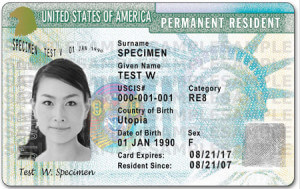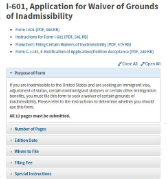We Practice Immigration Law. Nothing Else.
Our Practice Areas
-
I-130 – Family-Based Petitions
 The Form I-130 Petition is often the first step to bringing a loved-one to the U.S. Generally, a US Citizen can file for the following people: a spouse, a child (under 21), a parent (if YOU are over 21), or a brother/sister.
The Form I-130 Petition is often the first step to bringing a loved-one to the U.S. Generally, a US Citizen can file for the following people: a spouse, a child (under 21), a parent (if YOU are over 21), or a brother/sister.The rules for US Lawful Permanent Residents are a bit different, but you can also generally petition for immediate family to enter the U.S. This is a crucial first step since often there are long wait times for visas in certain categories.
After filing a Form I-130 Petition, a family member may be eligible to enter the US from abroad through a process called “consular processing” or obtain a “green card” in the U.S. through a process called “adjustment of status.” If you think you qualify to file a Petition for a loved one, please contact us to seek more information.
-
I-129F, Fiance Visa Petitions
 Before marriage, a US Citizen may be eligible to file for his/her fiancé. This process is called a “fiancé visa petition.” It can be a good alternative to the traditional Form I-130 if you have not lived with your fiancé for a long period of time or if you are interested in getting to know that person before getting married in the U.S.
Before marriage, a US Citizen may be eligible to file for his/her fiancé. This process is called a “fiancé visa petition.” It can be a good alternative to the traditional Form I-130 if you have not lived with your fiancé for a long period of time or if you are interested in getting to know that person before getting married in the U.S.This petition may also (under certain circumstances) be faster than the traditional Form I-130. If you have a foreign national fiancé and are considering marriage, contact our office to learn more about this process.
-
N-400, Citizenship and Naturalization
 The final step in the immigration process is to apply for Naturalization (Citizenship). For most U.S. Lawful Permanent Residents, this requires: (1) having US Lawful Permanent Residence for 5 years, (2) spending half of that time in the U.S., and (3) being a person of good moral character during that 5 year period.
The final step in the immigration process is to apply for Naturalization (Citizenship). For most U.S. Lawful Permanent Residents, this requires: (1) having US Lawful Permanent Residence for 5 years, (2) spending half of that time in the U.S., and (3) being a person of good moral character during that 5 year period.For certain U.S. Lawful Permanent Residents, you can apply for naturalization after 3 years. This applies if you are married to a U.S. Citizen for the last 3 years. In this case, the “good moral character” period also runs back three years from the date you file your Form N-400 Application.
Citizenship is the final step of the immigration process, and often problems that DID NOT come up earlier in the process may surface. Before applying for citizenship, it is a good idea to obtain complete information about the entire process and ensure that your application is approvable BEFORE you file it.
-
Business Immigration
 Businesses thrive on diversity. Hiring a diverse workforce that has the skills necessary to compete in a global world is key to maintaining a competitive edge. We assist employers in a variety of petitions from H-1B to “PERM”, we have assisted employers, entrepreneurs, and businesses with a variety of work-related immigration cases.
Businesses thrive on diversity. Hiring a diverse workforce that has the skills necessary to compete in a global world is key to maintaining a competitive edge. We assist employers in a variety of petitions from H-1B to “PERM”, we have assisted employers, entrepreneurs, and businesses with a variety of work-related immigration cases.If your firm is considering hiring a foreign national, contact us to speak about opportunities and options.
-
I-589, Asylum Law
 Perhaps no area of immigration law has higher stakes than asylum law. It is one of the most fundamental protections offered in the United States and is at the core of our moral, philosophical, and ideological foundation.
Perhaps no area of immigration law has higher stakes than asylum law. It is one of the most fundamental protections offered in the United States and is at the core of our moral, philosophical, and ideological foundation.No promise of America is greater than the promise of the New Colossus:
A mighty woman with a torch, whose flameIs the imprisoned lightning, and her nameMother of Exiles. From her beacon-handGlows world-wide welcome; her mild eyes commandThe air-bridged harbor that twin cities frame.“Keep, ancient lands, your storied pomp!” cries sheWith silent lips. “Give me your tired, your poor,Your huddled masses yearning to breathe free,The wretched refuse of your teeming shore.Send these, the homeless, tempest-tost to me,I lift my lamp beside the golden door!” -
Deportation Defense – US Immigration Court
 Deportation is by far the most complex area of immigration law. Again, the stakes are high, and the room for error is razor thin. If you have been placed in removal proceedings, it is essential that you obtain competent counsel who is familiar with the law.
Deportation is by far the most complex area of immigration law. Again, the stakes are high, and the room for error is razor thin. If you have been placed in removal proceedings, it is essential that you obtain competent counsel who is familiar with the law.Removal from the US can have serious and lasting consequences including being barred from the U.S. for a period of 10 years. Even if you don’t think you have an avenue of relief, you should contact a lawyer to review your options and obtain a clear answer about your case and your options.
-
I-601, Waivers of Inadmissibility
Merely being inadmissible to the U.S., or being placed in removal proceedings DOES NOT mean you should give up hope. Many grounds of inadmissibility are subject to waivers if you have a “qualifying relative” (usually a US Citizen or US Lawful Permanent Resident “green card” parent, spouse, or child).
Whether you can apply for a waiver of inadmissibility may depend on a number of factors including whether you US Citizen or US Lawful Permanent relative would suffer some form of hardship. It is important to examine every aspect of your case to see if you may merit a waiver.
The bottom line – even if you or a loved one has been charged with a ground of removability, inadmissibility, or deportability, it may not be over.
-
Green Card Defense
 Being a U.S. Lawful Permanent Resident (a “Green card” holder) is a wonderful opportunity to live and work in the United States. However, such a status – even if you held it for many years – does not mean it cannot be taken away. Green card holders are subject to a wide range of grounds of inadmissibility and deportability. The rules for these are complex and varied, and are often different from the rules that apply to non-green card holders.
Being a U.S. Lawful Permanent Resident (a “Green card” holder) is a wonderful opportunity to live and work in the United States. However, such a status – even if you held it for many years – does not mean it cannot be taken away. Green card holders are subject to a wide range of grounds of inadmissibility and deportability. The rules for these are complex and varied, and are often different from the rules that apply to non-green card holders.Common examples of problems “green card” holders may experience are:
- Abandonment of LPR status (staying outside the US for a year or more)
- Being convicted of a crime involving moral turpitude within 5 years of entering the U.S.
- Being convicted of two or more crimes involving moral turpitude, not arising out of a single scheme of criminal misconduct at any time.
- Being convicted of a controlled substances offense (other than simple possession of marijuana under 30 grams)
- Being “convicted under any law of purchasing, selling, offering for sale, exchanging, using, owning, possessing, or carrying, or of attempting or conspiring to purchase, sell, offer for sale, exchange, use, own, possess, or carry, any weapon, part, or accessory which is a firearm or destructive device”





